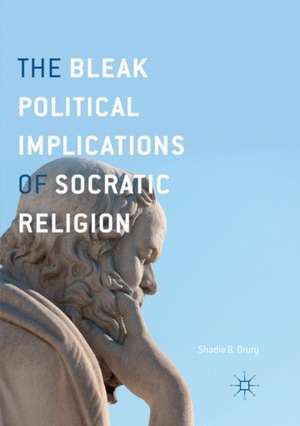The Bleak Political Implications of Socratic Religion
Autor Shadia B. Druryen Limba Engleză Paperback – aug 2018
The book makes the case for the prosecution, denouncing the religion of Socrates for inciting a radical politics of absolutism and monism that continues to plague Western civilization. It is time to recognize that Socrates was no liberator of the mind, but quite the contrary—he was the architect of a frightful authoritarianism, which continues to manifest itself, not only in Islamic terror, but also in liberal foreign policy. Defending Homer and the tragic poets, the book concludes that the West has imbibed from the wrong Greeks.
Preț: 191.19 lei
Nou
Puncte Express: 287
Preț estimativ în valută:
36.59€ • 37.98$ • 30.51£
36.59€ • 37.98$ • 30.51£
Carte tipărită la comandă
Livrare economică 19-25 martie
Preluare comenzi: 021 569.72.76
Specificații
ISBN-13: 9783319853932
ISBN-10: 3319853937
Pagini: 271
Ilustrații: XVII, 271 p.
Dimensiuni: 148 x 210 mm
Ediția:Softcover reprint of the original 1st ed. 2017
Editura: Springer International Publishing
Colecția Palgrave Macmillan
Locul publicării:Cham, Switzerland
ISBN-10: 3319853937
Pagini: 271
Ilustrații: XVII, 271 p.
Dimensiuni: 148 x 210 mm
Ediția:Softcover reprint of the original 1st ed. 2017
Editura: Springer International Publishing
Colecția Palgrave Macmillan
Locul publicării:Cham, Switzerland
Cuprins
1. The Political Case Against Socrates.- 2. The Religious Case Against Socrates.- 3. The Defense.- 4. How Plato Legitimizes the Case for the Prosecution.- 5. Plato’s Critique of Homer Repudiated.- 6. The Tragic Poets Defended.- 7. Socratic Mischief.
Recenzii
“This book is a provocative, polemical variation on the Nietzschean themes that Socratic philosophy was the will to power of an ugly man against a culture of beauty and that Christianity was Platonism for the masses. … The book is a helpful reminder to contemporary scholarship that the ironic Plato also had a reformist side to elevate democracy’s apolitical focus on bodily needs. Summing Up: Recommended. Upper-division undergraduates through faculty.” (W. J. Coats, Choice, Vol. 55 (5), January, 2018)
Notă biografică
Shadia B. Drury is Fellow of the Royal Society of Canada at University of Regina, CN. She is author of Aquinas and Modernity (2008), Terror and Civilization (2004), Leo Strauss and the American Right (1997), Alexandre Kojève: The Roots of Postmodern Politics (1994), The Political Ideas of Leo Strauss (updated Edition, 2005), and is a regular contributor to Free Inquiry.
Textul de pe ultima copertă
This book poses a radical challenge to the legend of Socrates bequeathed by Plato and echoed by scholars through the ages: that Socrates was an innocent sage convicted and sentenced to death by the democratic mob, merely for merely questioning the political and religious ideas of his time. This legend conceals an enigma: How could a sage who was pious and good be so closely associated with the treasonous Alcibiades, who betrayed Athens in the Peloponnesian war? How could Critias and Charmides, who launched a reign of terror in Athens after her defeat, have been among his students and closest associates?
The book makes the case for the prosecution, denouncing the religion of Socrates for inciting a radical politics of absolutism and monism that continues to plague Western civilization. It is time to recognize that Socrates was no liberator of the mind, but quite the contrary—he was the architect of a frightful authoritarianism, which continues to manifestitself, not only in Islamic terror, but also in liberal foreign policy. Defending Homer and the tragic poets, the book concludes that the West has imbibed from the wrong Greeks.
Caracteristici
Presents a provocative critique of authoritarian strains in Western political, religious, and social thought going back to Plato and Socrates Contributes to pluralistic discussions about the religious underpinnings of classical political and social thought Discusses a deep range of political, religious, and theoretical works in an accessible, engaging argumentative style
